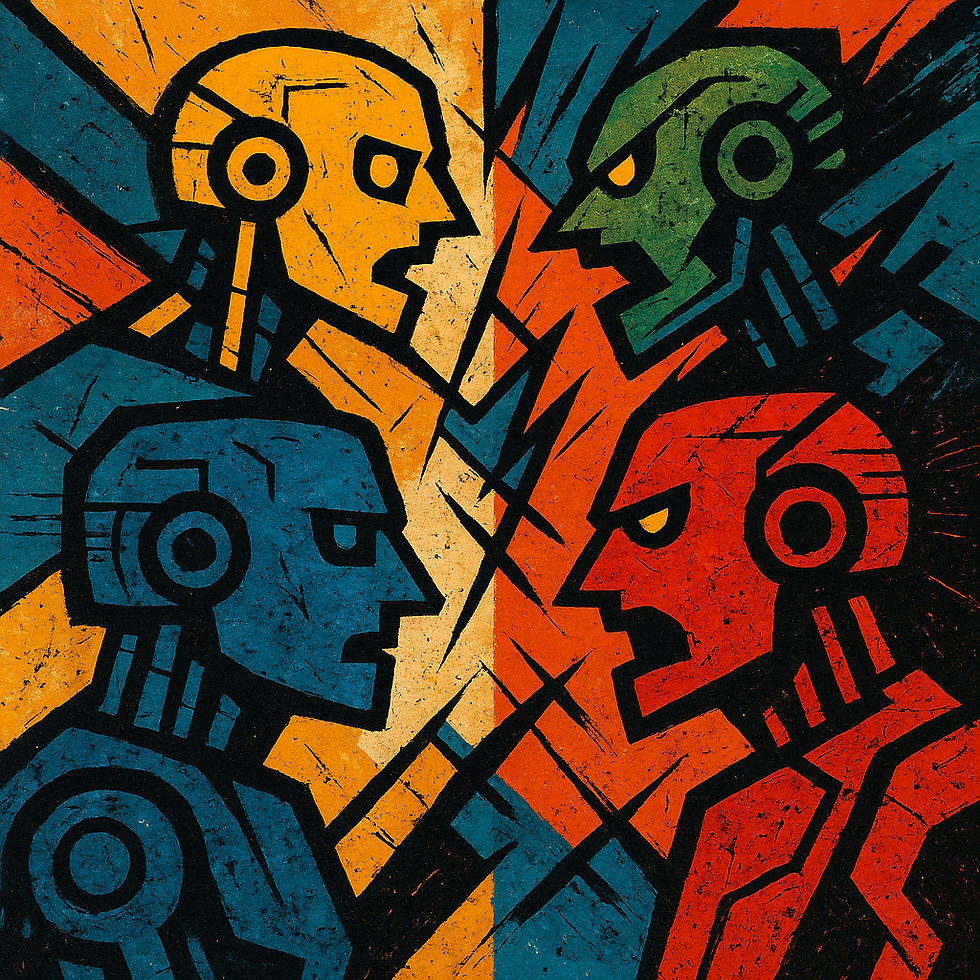Misinformation? What about "Miseducation"?
- Rah Boz
- Jun 27, 2025
- 4 min read
In The Age Of Information, Ignorance Is A Choice

We live in the Age of Information™ — a golden era where every answer to every question known to humankind sits just a few thumb-swipes away. Want to know how tall Mount Everest is? Need the population of Croatia in 1987? Curious about the gestation period of an alpaca? All of it is online. Instantly accessible. Available before your thumb even finishes typing thanks to the almighty autocomplete.
Yet somehow… somehow… many people today still confuse their and they're, still think “defiantly” is a cool way to say “definitely,” and still can’t remember if you should “bare” with someone or “bear” with them (hint: one involves emotional patience, the other, nudity).
Welcome to the era of miseducation — where having all the knowledge in the world at our fingertips hasn’t necessarily made us smarter, but has made us feel like we are. And that, dear reader, is where the trouble starts.
The Illusion of Knowing
Imagine you have a luxurious, Olympic-sized pool in your backyard. Sounds amazing, right? But if you have access to that pool all the time, it quickly becomes mundane. "I'll swim later," you tell yourself. "I don’t need to swim today — it’s right there." Then three years go by and the only time you used it was that one summer BBQ where Uncle Jerry did a belly flop that still haunts your dreams.
That’s what the internet is like. We have all the world’s wisdom — entire libraries! — at our disposal, but because it’s so easy to access, we don’t engage with it meaningfully. Why bother learning to spell "conscientious" when autocorrect will fix it for you? Why learn how to calculate percentages when there's a calculator app and ten TikToks promising "percent hacks schools don't want you to know"?
It’s not a lack of access. It’s a lack of engagement.
ADHD, Dopamine, and the Death of Depth
Add to this equation a generation grappling with attention-deficit/hyperactivity disorder (ADHD) — whether diagnosed or just hyper-stimulated by the buzzes, beeps, and bite-sized dopamine bursts of 21st-century life — and you get something even more tragic: a collective brain that is overstimulated and undernourished.
We’re built now to scroll, not to study. To skim, not to synthesize. To react, not to reflect.
Want to read an article longer than two paragraphs? Sorry, the comments section beckons. Want to take time to understand how the quadratic formula works? Too late, your brain just reminded you there’s a new video titled “Top 10 Funniest Cat Fails Caught on Doorbell Cameras.”
And just like that, poof — attention span gone. Learning opportunity lost.
From Misinformation to Miseducation
While the world rightly wrings its hands about misinformation — false news, conspiracy theories, deepfakes, flat Earth societies that somehow still exist — we often forget its equally dangerous cousin: miseducation.
This isn't about being deliberately misled. It’s about being accidentally ignorant. It’s the quiet tragedy of slowly forgetting how to think because you're too busy scrolling, tapping, liking, and relying on Google to carry your intellectual backpack.
We’re not dumb because we don’t have information. We’re dumb because we don’t bother internalizing any of it.
Case in point: autocorrect. It’s a crutch. A helpful one, sure — especially when your thumb slips on your phone screen and you end up typing “ducking” instead of… well, you know. But over time, it erodes our muscle memory. Why should you remember the spelling of “definitely” if the red squiggly line will fix it anyway? Why learn grammar rules when Grammarly will make your essay sound like a tech CEO’s LinkedIn post?
The Chronic Stupidity Loop
This cycle leads us to something I like to call chronic stupidity — a persistent state of low-effort cognition. It’s not about lack of intelligence. It’s about lack of discipline. The tragic irony? We have the potential to be the smartest generation ever… but only if we actually use the tools we’re given.
It's not the pool's fault you forgot how to swim.
It's not the internet's fault you can't spell “receive.”
It’s not ADHD’s fault you abandoned that article halfway through.
It’s not auto-correct’s fault your vocabulary has all the variety of a soggy potato.
It’s the habit — or lack thereof — of active learning that’s the issue. And it’s hurting us more than we realize.
So What Now?
We can laugh at this (and let’s be honest — we should, because there’s nothing more human than messing up “your” and “you’re” for the 300th time), but there’s also a simple solution:
Swim in the pool.
Use the dictionary before autocorrect steps in. Take the extra 15 seconds to think about a math problem before punching it into your calculator. Finish reading the article instead of jumping to the comments. Let your brain work. Not everything needs to be fast. Not everything should be.
Because real learning? Real intelligence? That comes from struggle. From curiosity. From repetition. From getting it wrong and then getting it right. Not from shortcuts. Not from spellcheck. Not from Chat GPT.
But Seriously, Read the Whole Thing
We don’t suffer from a lack of information. We suffer from a lack of intention. The digital world is a pool that anyone can swim in — but it doesn’t make you a swimmer just because it’s there. It’s not just about misinformation anymore.
It’s about miseducation. And the only way out of it… is to care enough to learn.
Now go read a book. And turn off autocorrect. Just for today. I dare you.






Comments